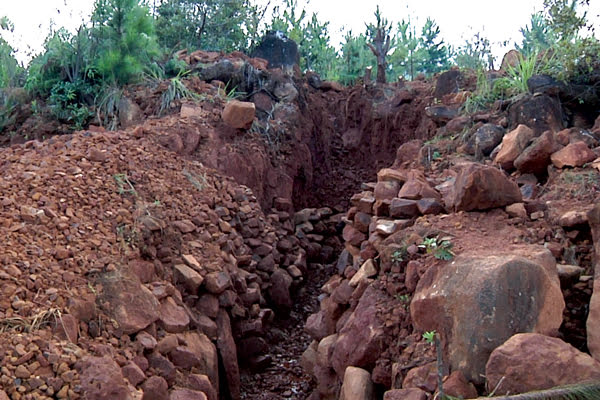RAMPANT illegal gold mining activities in timber plantations in Chimanimani is still going unabated with artisanal miners leaving a trail of destruction in both the commercial forest areas as well as the environment, The Manica Post can reveal.
A recent visit to the area revealed a sad story of deep tunnels being dug in forests while rivers are not only diverted but also polluted as multitudes of artisanal miners excavate the red soils of Chimanimani in search of the precious mineral.
Water in the Nyabamba River near Roscommon Estate, a once stunning haven of globally endangered species of birds with imposing pine and tea plantations starting from its banks, is now bright red in colour due to soil and chemical residue contained in the waste after the panning processes.
Down in Rusitu village in Tarka Forest within Chimanimani district, a timber estate of hundreds hectares of prime timber owned by Allied Timbers has been damaged to make way for the illegal mining.
Chief executive of the Timber Producers Federation Mr Darlington Duwa warned of lasting damage as a result of the disappearing forests and water pollution caused by illegal mining.
“It (illegal mining) reduces the timber resource, thus affecting direct and indirect employment, economic development, foreign currency earnings and leads to environmental degradation and reduced resilience to climate change effects.
“In some areas illegal miners (settlers) uproot young trees that have been planted,” Mr Duwa said.
“At this rate, the industry is bound to suffer irreversible damage.”
Chimanimani Tourism Associ- ation vice chairperson Mr Collen Sibanda lamented the effects of illegal mining and its effects not only on timber plantations but the generality of flora and fauna.
“It is sad that people want quick returns and they engage in illegal gold mining.
“This is happening at the expense of timber plantations here in Chimanimani and also the indigenous forests that used to provide the much needed cover to our land.
“As people of Chimanimani, we are crying out that let the economy of the district stand on all legs and that is tourism, timber production and mining.
“We really want mining but it has to be organised and mindful of its environmental consequences.
There have been a number of deaths in different areas around the villages in Chimanimani owing to water-borne diseases and even though data has not been formally collected, suspicion is rife that contamination of water by illegal panners was a major contributor.
“We strongly believe that consumption of water downstream is leading to ailments and in some cases deaths simply because the water is no longer safe for drinking as artisanal miners have mixed it with several chemicals during their operations,” said Mr Sibanda.
Security forces have often carried out sporadic raids in different parts of Chimanimani where illegal mining is rmpant but facts on the ground suggest that this has not deterred artisanal miners from flocking the gold-rich area.
Manicaland police spokesperson Inspector Tavhiringwa Kakohwa said they remained resolute in keeping artisanal miners at bay and to that end the law enforcement agents would keep on carrying out sporadic raids.
“We have been carrying out raids in different parts of Chimanimani and the Eastern Highlands at large where artisanal miners operate illegally. Yes, there has been resistance since we always see the artisanal miners returning to the same areas.
“However, we will keep on raiding those areas until sanity prevails. We want people to do the right thing and formalise their operations for the benefit of the economy,” said Inspector Kakohwa.
Manica Post




